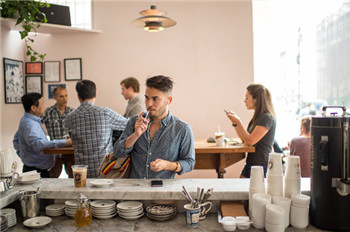
What if the cappuccino you had this morning was not, in fact, a cappuccino? Scary. More worrisome still: What if your flat white was?
如果你今天早上喝的那杯卡布奇诺,其实不是卡布奇诺,那可怎么办?太可怕了。而更吓人的是:如果你的小白咖啡(flat white)才是地道卡布奇诺呢?
There was a time when cappuccino was easy to identify. It was a shot of espresso with steamed milk and a meringue-like milk foam on top. But now the onetime king of specialty coffee drinks is having a bit of an identity crisis.
曾几何时,卡布奇诺是很容易鉴别的。一份浓缩咖啡,加上热牛奶,最上面盖一层蛋白霜似的奶泡。然而,这个曾经的特种咖啡饮品之王,如今正遭遇一场身份危机。
Even among experts, there is considerable disagreement concerning what exactly a cappuccino is, with some of those in the know focusing on the size of the drink as its distinguishing characteristic.
卡布奇诺到底是什么,即使在专家中间也存在不小的争议,在行的都把重点放在咖啡的大小上,认为这是区分彼此的特征。
“In the U.S., cappuccino are small, medium and large, and that actually doesn’t exist,” the food and coffee writer Oliver Strand said. “Cappuccino is basically a four-ounce drink.”
“在美国,卡布奇诺有小杯、中杯、大杯,这其实是生造出来的,”美食和咖啡作家奥列佛·斯特兰德(Oliver Strand)说。“卡布奇诺基本上就是一种4盎司的饮品。”
Todd Carmichael, a founder of La Colombe, a coffee roasting company with cafes in New York and other cities, is not so hung up on the ounce factor. “We’ve made the cappuccino mobile,” he said. “With 8 to 10 ounces, the flavors do not go away. They’re just less intense.”
在纽约等地开有咖啡馆的咖啡烘焙公司La Colombe创始人托德·卡尔米切尔(Todd Carmichael)认为,不应该死盯着份量这一个因素。“我们让卡布奇诺灵活起来了,”他说。“8到10盎司的情况下,它的风味并没有消失。只是没那么浓烈了。”
Others cling to old-school notions of what makes a cappuccino, with the layering of ingredients as the main thing. “The goal is to serve three distinct layers: caffè, hot milk and frothy (not dense) foam,” the chef and writer Mario Batali wrote in an email. “But to drink it Italian style, it will be stirred so that the three stratum come together as one.”
还有人坚守着对卡布奇诺的老派定义,几种成分的分层是重点。“目标是三个不同的层:咖啡、热牛奶和有泡泡(不细密)的奶泡,”厨师、作家马里奥·巴塔里(Mario Batali)在邮件中说。“但是要按意大利人的喝法,必须要搅拌,让三层混合在一起。”
With the stirring of the drink, one may see the distinctive red-brown color similar to that of the habits worn by men belonging to the Order of Capuchin Friars Minor, a resemblance believed by some to have given the beverage its name.
搅拌后咖啡呈现一种特别的红棕色,跟方济嘉布遣会(Order of Capuchin Friars Minor)修士身上的道服颜色接近,有人因此认为饮品的名字就是由此而来。
Joe, a cafe with 13 locations in New York and Philadelphia, serves a cappuccino that is not layered, with no bubbly foam on top. “The consistency should be the same from the first sip to the last,” said Jonathan Rubenstein, one of Joe’s founders.
Joe在纽约和费城有13家分店,它的卡布奇诺是不分层的,最上面也没有看得见泡泡的奶泡。“从第一口到最后一口,口感应该是一样的,”Joe创始人之一乔纳森·鲁本斯坦(Jonathan Rubenstein)说。
The Joe version would seem to violate the cappuccino standards put forth by the Specialty Coffee Association of America (S.C.A.A.) and its Barista Guild, which advocate a one-centimeter layer, minimum, of milky foam.
Joe的版本似乎违背了美国特种咖啡协会(Specialty Coffee Association of America,简称SCAA)及其下属咖啡师行会(Barista Guild)推行的卡布奇诺标准,该标准主张最少要有一厘米厚的奶泡。
Only one centimeter? Sounds dangerously close to a latte. But who would know better than the S.C.A.A.? “It’s kind of ridiculous,” said David Schomer, the founder of Espresso Vivace in Seattle.
才一厘米?感觉一不留神就要成拿铁了。但这可是堂堂SCAA的标准。“有点荒谬,”西雅图Espresso Vivace创始人戴维·舒默(David Schomer)说。
Some coffee specialists pointed to “latte art creep” as responsible for the small amount of foam in the modern-day cappuccino, noting that it is easier for baristas to make intricate designs with less froth in a time of Instagram-ready food and drink.
有咖啡专家认为,都是那些“拿铁艺术婊”导致现代卡布奇诺的奶泡如此之少,他们说,在这个无Instagram不成炊的年代,较少的泡沫有利于咖啡师做出繁复的花式。
Given the changes in what constitutes a cappuccino, some people may find themselves with an attachment to an incarnation of the drink that was in style when they came of coffee-drinking age. “Back in 1985, the best cappuccino was the one with five-inch mounds of froth sprinkled with cinnamon,” the restaurateur Daniel Meyer wrote by email. “We gave up on foam in 2006.”
鉴于卡布奇诺的定义在变,有些人也许会对自己开始喝咖啡的那个年代时兴的版本特别有感情。“1985年的时候,最好的卡布奇诺是有一座五英寸的奶泡山的,上面撒肉桂,”餐馆业主丹尼尔·梅耶尔(Daniel Meyer)在邮件中写道。“我们在2006年告别了奶泡。”
Mr. Carmichael of La Colombe recalled the cappuccino at an influential cafe in Seattle, Torrefazione Italia, long before specialty coffee drinks were common. “Cappuccino was coffee with really thick meringue-type foam,” he said. “You could set an olive on it and it wouldn’t sink.”
在影响深远的西雅图咖啡馆Torrefazione Italia,La Colombe的卡尔米切尔回忆起特种咖啡远未普及的年代,卡布奇诺是什么样子。“所谓卡布奇诺就是有非常厚的、蛋白霜式的奶泡,”他说。“在上面放一颗橄榄不会沉下去。”
Kenneth Nye, who founded the East Village cafe Ninth Street Espresso in 2001, grew so sick of customers’ insistence on what they believed to be a “real” cappuccino that he removed all the drink names from his menus. “All it says is ‘espresso with milk,’ ” Mr. Nye said. “We stopped with the names because it’s all silly.”
肯尼思·奈(Kenneth Nye)2001年在纽约东村开了第九街意式咖啡馆(Ninth Street Espresso),他不堪忍受那些深信自己知道什么是“正宗”卡布奇诺的顾客,去掉了菜单上所有饮品的名称。“全都是‘意式浓缩加牛奶’,”奈说。“我们不再用名称是因为,所有名字都很傻。”
The new enthusiasm for the flat white, a drink made of espresso and milk that seems to have originated in Australia or New Zealand, is particularly nettlesome to Mr. Nye. “You put 10 people in a room who claim to be an authority on the flat white, you’re going to get at least five different opinions on what it should be,” he said. “People are trying to make the whole process intimidating to the consumer.”
新近走红的小白咖啡让奈格外恼火,这种用意式浓缩咖啡和牛奶制成的饮品,似乎是澳大利亚或新西兰传来的。“你去找10个自称的小白咖啡权威来,问他们什么是小白咖啡,至少能得到五种说法,”他说。“这是要让顾客对整个制作过程心生敬畏。”
Not everyone who cares about such matters has adopted Mr. Nye’s heck-with-it attitude toward coffee taxonomy. The Instituto Nazionale Espresso Italian, for one, calls for “25 ml espresso and 100 ml steam-foamed milk.” Coffee lovers in Italy believe so strongly in the idea of an authentic cappuccino that in 2007, the head of the nation’s commission on agriculture, Marco Lion, proposed government certification for cafes that make the drink the right way. (The government was dissolved before any action could be taken.)
并非所有关心这类问题的人都像奈这样,对咖啡分类学不屑一顾。比如国立意大利浓缩咖啡研究所(Instituto Nazionale Espresso Italian)就呼吁使用“25毫升浓缩咖啡和100毫升蒸汽搅打奶泡”。意大利咖啡爱好者对地道卡布奇诺的理念是十分坚持的,以至于该国农业委员会主席马可·里翁(Marco Lion)在2007年提出,政府应向使用正确制作方法的咖啡馆颁发证书。(那届政府还没来得及采取任何举措就解散了。)
But the notion of an Italian ideal is dismissed by others. “Even in Italy, it varies,” Mr. Nye said. “The one commonality was that it was small and considered a morning drink.”
但有人对所谓意大利完美标准也不以为然。“即使在意大利也是多样的,”奈说。“唯一的共通之处是份量较小,被认为是一种早晨的饮品。”
The drink’s origins are likely Austrian, said Andy Smith, a culinary historian at the New School. It went mainstream with the rise of Starbucks, which Howard Schultz bought and began expanding (along with the sizing of cappuccino) in the late 1980s. “They should be given some credit,” Mr. Smith said.
新学院(New School)烹饪史学家安迪·史密斯(Andy Smith)说,卡布奇诺可能起源于奥地利。是随着星巴克的崛起而普及起来的,霍华德· 舒尔茨(Howard Schultz)在1980年代末收购了这个品牌,而后越做越大(随之变大的还有卡布奇诺的份量)。“应该是有他们一份功劳的,”史密斯说。
Perhaps the best cappuccino is made without the fancy barista work or other trappings. “For perfection,” Mr. Batali said, “see the Italian roadside version of fast food, the Autogrill.”
也许最好的卡布奇诺不需要花哨的咖啡师技法或其他装饰。“什么叫完美追求,”巴塔里说。“去看看意大利路边摊版快餐Autogrill。”












